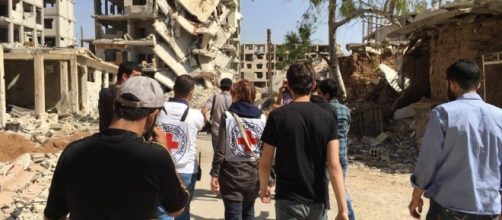Turkey has ordered Mercy Corps to cease its delivery of Humanitarian Aid services to Syrian refugees fleeing the civil war torn country. According to the Washington Post, the Oregon based aid group which is said to be one of the biggest organizations of its kind presently delivering aid to the battered refugee community, will no longer be able to continue its delivery of everyday humanitarian aid to the hundreds of thousands of Syrians who have crossed over the border into Turkey. The stoppage also purportedly includes prohibiting the delivery of aid to the sick, the wounded, the old, and the young.
Refugee and aid worker hearts are broken
Mercy Corps spokesperson, Christine Bragale, said Wednesday from her post in Turkey, that her heart, and the hearts of her coworkers are broken over the sudden turn of events initiated from out of Ankara. This, after enjoying a cooperative relationship with the Turkish government and its partners for nearly five full years.
Other refugee affected humanitarian aid organizations
It remains unclear whether or not the aid group was cherry-picked by the Turkish government in the ceasing of its operations or if other similar humanitarian operations will also be required to stop their efforts, or so reports the global military news organization SOFREP. While government officials close to the situation remains closed mouth about restoring its operations, Bragale is said to be hopeful that the government will, at the very least, allow them to service the most needy and the most critical, including the elderly, the sick, and the very young.
In order to do that, she went on, a dialogue must be restored.
US State Department weighs in on refugee crisis
Obama era US State Department spokesman, Mark Toner, said he is monitoring the situation between Mercy Corps and the Turkish government. He also added Mercy Corps has proven itself a valuable partner in the relocation and treatment of the Syrian refugees. Since the civil war began, Turkey has admitted more than 3 million refugees, most of whom are resettled in camps located in the towns and villages along the country’s southern border.

